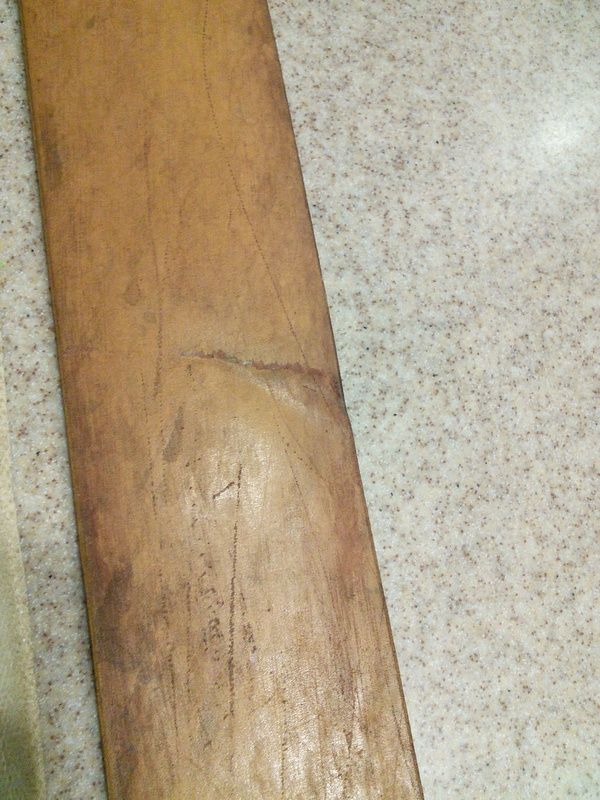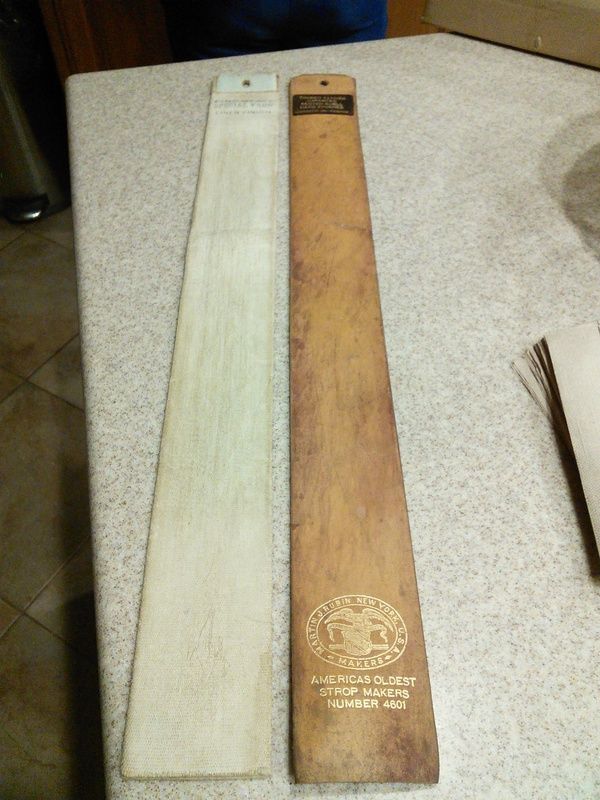Results 1 to 10 of 24
-
08-20-2015, 01:36 PM #1Senior Member

- Join Date
- Mar 2015
- Location
- Southern California
- Posts
- 114
Thanked: 20 Strop Restoration - Martin J Rubin
Strop Restoration - Martin J Rubin
I won this strop on the bay this week for a very reasonable price. The seller had no knowledge of shaving equipment and documented all of the damage on the strop in the sales ad, which I found admirable by them. The only problem is, since they knew nothing of strops, they said the "backside" of the strop had a cut in it, but the strop, to my knowledge, was in the holder backwards and the gouge is on the front printed side. (The printed side "feels" like it should be the the stropping side and to my knowledge the side with the manufacturing info is "generally" always the stropping side.) The linen is in great shape and the leather, though dry like most all vintage strops, seems to be in good condition, just needing some serious moisturizing.
Would you recommend sanding the entire stropping side, or just the area where the gouge is? I am planning on cleaning with some saddle soap, but I will be more careful with this strop. The last one I did was so gunky and nicotine stained, I obliterated the "Clydesdale" and "Certifyed" logos with zealous scrubbing. Attached are some photos. Thank you in advance for the help and recommendations.




-
08-20-2015, 02:00 PM #2Senior Member




- Join Date
- Feb 2013
- Location
- Haida Gwaii, British Columbia, Canada
- Posts
- 14,436
Thanked: 4827
I would not sand the entire surface. Any flaps can be glued down with rubber cement. A smooth piece of glass works well to smooth the surface. I think most of the time a glass or bottle gets used. Be careful with how much neatsfoot oil you use. I have a strop that you can oil your blade while stropping. Slow and steady wins the race.
It's not what you know, it's who you take fishing!
-
The Following User Says Thank You to RezDog For This Useful Post:
TheFiveO (08-20-2015)
-
08-20-2015, 03:20 PM #3Senior Member

- Join Date
- Mar 2015
- Location
- Southern California
- Posts
- 114
Thanked: 20
Thanks Rez. Yea the other strop I did had one piece of Shell Cordovan and the other was leather. I used Ballistol on the leather and TONS of neatsfoot on the Horsehide. The stropping side feels great but I have to keep wiping neatsfoot off the back side where is comes out the pores. The neatsfoot side had GREAT elasticity now though!
-
08-20-2015, 04:14 PM #4

Looks like a good find. I would start with using a damp but not wet cloth to try and clean the leather off. It should get darker as it absorbs a bit of water. Once you have both sides cleaned pretty well, use a flat round piece of glass to smooth the surface of the leather first. Be carefull to keep the glass flat, so as not to gouge the leather. Let it dry for at least a day. After it dries, you will have a better idea of what you need to work on, to see what kind of glue/ sanding you need to do.
After this is done, you can get an idea if you will need to oil it or not.
-
The Following User Says Thank You to Drygulch For This Useful Post:
TheFiveO (08-20-2015)
-
08-20-2015, 04:30 PM #5

Also, Shell leather is made by sanding the grain surface (skin) of the leather from the cheeks of the backside of a horse. The fibers just below the grain surface are very dense, and go in all directions. This surface is buffed to make the sufrace of shell leather. So if the damage is not something you can smooth out, you can restore funtion to the strop by using the backside of the leather strip, which the original owner may have done. That would explain the leather being backwards.
-
The Following User Says Thank You to Drygulch For This Useful Post:
TheFiveO (08-20-2015)
-
08-20-2015, 08:22 PM #6

I've had good luck cleaning and brightening linen in a large pot of water + OxyClean. Heat the water, slowly add OC (it will bubble over if the pot is too full or the OC goes in too fast) and stir. Put in the linen strop until the water is disgusting; rinse/repeat until you're happy with the results. So far this method has, at worst, lightened nomenclature a little. If three or four treatments don't do the trick there is always some Dawn/blue and a scrub brush to try. The stuff is incredibly tough. Pat dry, flatten or hang. Iron/steam out irregularities (if any) after drying.
What they said above - go slow on the leather and don't use much oil treatment. I spent a couple of hours cleaning up an oldie a couple of weeks ago. Between a bolng the linen, a little saddle soap froth to lift the leather grunge, some very light spot sanding and a touch up with dye it came out great. Nice action and very decent appearance considering how rotten it looked when it arrived. I swear, old strops always end up looking better than I'd imagine given some time/patience.
Good luck. Post "AFTER" pix!Last edited by MisterMoo; 08-20-2015 at 08:30 PM.
"We'll talk, if you like. I'll tell you right out, I am a man who likes talking to a man who likes to talk."
-
-
08-21-2015, 05:36 PM #7Senior Member

- Join Date
- Mar 2015
- Location
- Southern California
- Posts
- 114
Thanked: 20
I wiped it down with a damp rag last night and it got pretty dark. (The surface of the leather.) I hope it lightens back up. I used just a little saddle soap on the damp rag too. As I was wiping it down, the cut was really lifting up, almost like its delaminating from the top surface. My initial gut feeling is that I will be able to lift it up and apply a little rubber cement under it and then clamp it flat. I'll probably lightly sand and then begin the slow neatsfoot conditioning process. The first round of Oxi-Clean linen cleaning went really well and after just one round it actually looks pretty nice. I only lost some of the "S" in "Special Linen"
A couple of issues have come up. I am using Frielings Saddle Soap and it says to "lather up" but for the life of me I cant get any lather. It stays more like mink oil. Second, do you recommend neatsfoot or should I use a leather "conditioner". Lots of tack shops where I live so I have access to bothLast edited by TheFiveO; 08-21-2015 at 05:42 PM.
-
08-21-2015, 10:02 PM #8

FWIW, I cut a flap in my Tony Miller horsehide some years ago (if you're going to drink, don't strop) and I used Contact Cement to glue it. You can't see it if you didn't know it was there.
Be careful how you treat people on your way up, you may meet them again on your way back down.
-
08-21-2015, 11:00 PM #9Senior Member




- Join Date
- Feb 2013
- Location
- Haida Gwaii, British Columbia, Canada
- Posts
- 14,436
Thanked: 4827
I doubt that a clamp is going to be needed to get that flat to lay flat. lift it up and dab a little contact cement under it, let the flap down to spread the glue and then lift it back up. Allow the glue to dry to almost no tack left, then lay it down and smooth it from the back to the open edge. Wipe up any extra glue before it dries. All will be well.
P.S.
Don't oil it until the glue is set up and use the mink oil.It's not what you know, it's who you take fishing!
-
08-22-2015, 04:11 PM #10Historically Inquisitive



- Join Date
- Aug 2011
- Location
- Upstate New York
- Posts
- 5,782
- Blog Entries
- 1
Thanked: 4249
For cleaning the linen http://straightrazorpalace.com/strop...ditioning.html


 23Likes
23Likes LinkBack URL
LinkBack URL About LinkBacks
About LinkBacks






 Reply With Quote
Reply With Quote

